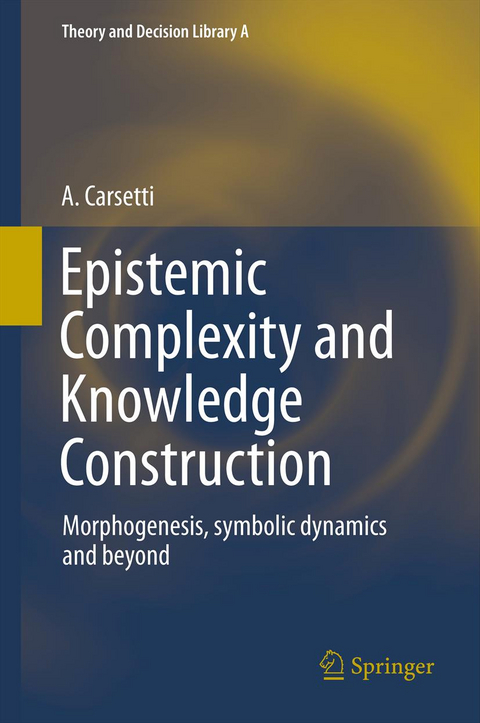
Epistemic Complexity and Knowledge Construction
Springer (Verlag)
978-94-007-9724-6 (ISBN)
As is well known, cognition is not only a self-organising process. It is also a co-operative and coupled process. If we consider the external environment as a complex, multiple and stratified Source which interacts with the nervous system, we can easily realise that the cognitive activities devoted to the "intelligent" search for the depth information living in the Source, may determine the very change of the complexity conditions according to which the Source progressively expresses its "wild" action. In this sense, simulation models are not neutral or purely speculative: the true cognition actually appears to be necessarily connected with successful forms of reading, those forms, in particular, that permit a specific coherent unfolding of the deep information content of the Source. Therefore, the simulation models, if valid, materialise as "creative" channels, i.e., as autonomous functional systems, as the very roots of a new possible development of the entire system represented by mind and its Reality. From a general point of view, the objectivity of Reality is also proportionate to the autonomy reached by cognitive processes.
In this sense, at the level of cultural evolution, reference procedures act as guide, mirror and canalisation with respect to primary information flows and involved selective forces: they offer themselves as the actual instruments for the constant renewal of the code, for the invention and the actual articulation of an ever-new incompressibility. From an effective point of view, they appear as indissolubly linked to the successive definition of specific (and innovative) measures of the epistemic complexity. These measures cannot concern only statistical rarity (Shannon) or computational incompressibility (Kolmogorov-Chaitin), on the contrary they should also be able to take into account the coupled connection between the Source and the cognitive agent, the evolution of this connection as well as the successive constitution of meaning as symbolic form. Hence the possible (and necessary) definition of new axiomatic systems, new measure spaces, the real displaying of processes of continuous reorganisation at the semantic level. Indeed, it is only through a complete, first-order "reduction" and a correlated non-standard second-order analysis that new incompressibility will actually manifest itself. Therefore, the reference procedures appear to be related to a process of multiplication of minds, as well as to a process of "clarification" of meanings which finally emerges as vision via principles.
Dedication.- Acknowledgements.- 1. Complexity, Self-Organization and Natural Evolution. - 1. Entropy and the “intermediate state”.- 2. Algorithmic complexity and self-referentiality .- 3. Cellular automata and self-organization. - 2. Embodiment Processes and Biological Computing.- 1. The game of life and the alternative splicing. - 2. The interface between ruler and coder.- 3. The recipe at work: the role of the simulation tools at the evolutionary level.- 4. Reflexive domains vs. self-organizing domains. - 3. Randomness, Semantic Information and Limitations Procedures. - 1. Logic and probability: the role of constituents. - 2. Semantic information and algorithmic complexity.- 3. Surface information vs. depth information: the biological computer.- 4. Non-standard models and limitation procedures.- 4. Natural Language and Boolean Semantics: the Genesis of the Cognitive Code. - 1.Intensional language and natural logic.- 2. Logic and ontology.- 3. Meaning as use and the unfolding of cognitive activity.- 5. Morphogenesis and the Emergence of Meaning. - 1. Eigenforms, categorial intuitions and rational perception.- 2. Meaning clarification and the "thinking I".- 3. Knowledge and Reality: the role of conceptual constructions. - Name Index.- Subject Index.
| Reihe/Serie | Theory and Decision Library A ; 45 |
|---|---|
| Zusatzinfo | X, 151 p. |
| Verlagsort | Dordrecht |
| Sprache | englisch |
| Maße | 155 x 235 mm |
| Themenwelt | Geisteswissenschaften ► Philosophie ► Allgemeines / Lexika |
| Geisteswissenschaften ► Philosophie ► Erkenntnistheorie / Wissenschaftstheorie | |
| Geisteswissenschaften ► Psychologie ► Verhaltenstherapie | |
| Informatik ► Grafik / Design ► Digitale Bildverarbeitung | |
| Mathematik / Informatik ► Informatik ► Theorie / Studium | |
| Naturwissenschaften ► Physik / Astronomie ► Thermodynamik | |
| Schlagworte | Complexity • Constructivism • Epistemology • Knowledge • Self-Organisation |
| ISBN-10 | 94-007-9724-9 / 9400797249 |
| ISBN-13 | 978-94-007-9724-6 / 9789400797246 |
| Zustand | Neuware |
| Haben Sie eine Frage zum Produkt? |
aus dem Bereich


